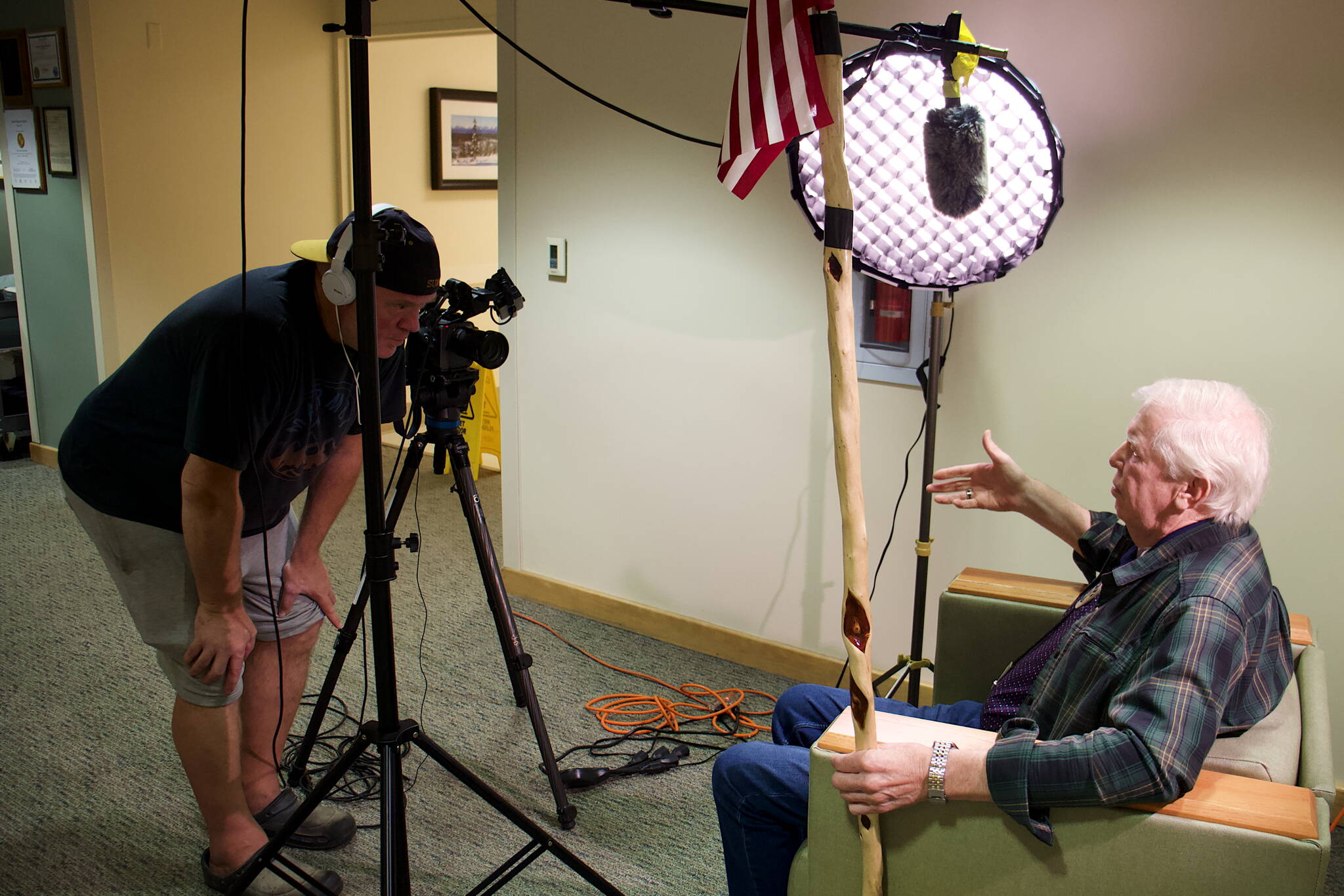Jerry Adams says he became a hospice and home care volunteer when people who were regulars for his Meals on Wheels deliveries disappeared from his route. He found out it was because they were instead receiving end-of-life care, so he started helping with that so he could see them again.
When official hospice and home services were suddenly shut down last fall by Catholic Community Service after 20 years, he kept visiting homes to comfort ailing people and their families in an unofficial role.
“I’ve never stopped,” said Adams, perhaps best known as the longtime founder and owner of Jerry’s Meats & Seafood until his retirement several years ago, which is when he became active as a volunteer.
Now that Bartlett Regional Hospital has started accepting hospice and home care patients during the past month, he showed up at a celebratory opening Thursday evening. He was the first during the two-hour event to sit in a pop-up video studio in a hallway at the hospital where people were invited to share their experiences providing or receiving such services.
“I’m excited to see how many people are here,” he told the camera.
Dozens of staff and volunteers with the new programs, family members of patients receiving such care in the past, and others showed up for the event. They bid on silent auction items and saw Bob Urata, a doctor credited with establishing and growing hospice care in Juneau, presented with the “Person of the Year” award by the Foundation for End of Life Care.
It was a celebratory moment for the hospital, which in recent months has struggled with crises involving patient care and staff that resulted in the resignation of CEO David Keith last month. Keith, who lasted less than a year after moving from Oklahoma to start the job last August, said in November he hoped the hospital could resume hospice services within 60 to 90 days, but the permitting process would prove to be longer and more complex, with the state approving provisional licenses for both services in May.
The provisional license means the hospital is seeing a limited number of patients, but “additional team members will be onboarded in the coming months,” according to the hospital’s website. As of Friday there were four patients in the hospice program and four in the home care program. Last summer, when Catholic Community Services indicated it was having financial and staffing problems that might forced it to halt services, it had roughly 50 home health patients and several hospice patients.
Among the colleagues Keith recruited from Oklahoma for the hospice and home care program was Kim Stout, now Bartlett’s executive director for post-acute care. She said Thursday the programs that officially began about four weeks ago are mostly going smoothly as they phase in patients and staff, although the demand for specific services is somewhat different than expected.
“I didn’t expect physical therapy to be a primary service that would be sought after,” she said, noting she received four referrals for it during the past week.
The program, which is also using some of the hospital’s regular staff, also offers occupational therapy, speech-language pathology, social workers and dietician employees, and two volunteer chaplains among its services.
Two nurses now with Bartlett’s hospice and home care program said the work is considerably different than other traditional nursing care — but also remarkably rewarding given patients and families are coping with end-of-life issues.
“It’s an honor and a privilege to work with people in their most vulnerable places, in their home — which is, you know, their sanctuary. Where they feel safe,” said Heather Paige, who spent 10 years working at Wildflower Court, a long-term nursing care facility Bartlett also recently acquired.
Deena McDougal, said her nursing work has involved terminal patients and their families since her experience includes Bartlett’s emergency room. But hospice and home care involve a completely different mentality for everyone involved.
“The amazing thing is that it’s a really direct involvement with the patient and the family,” she said. “And planning together the best death for the person and the best death that the family can imagine. So it’s a really special situation.”
The award to Urata was presented by Seanna O’Sullivan, president of the Foundation for End of Life Care, who said she first met the doctor at the hospital in 2009 when she was in labor. He gave her the unwelcome news that a cesarean section might be necessary for the birth of her daughter, although that didn’t come to pass.
“Fourteen years later he sat that girl down with her two little sisters in my living room, and he told her that it was time for her to say goodbye to her dad because he was dying,” O’Sullivan said. “And that was another message that was not very well received. But I was very, very grateful for that message because I needed him. I needed people like Dr. Urata to be there to help my family through that time.”
O’Sullivan said her husband’s diagnosis with terminal cancer was difficult for him and the family, yet the reality of death is something everyone will eventually face.
“He did get to choose how he wanted to die,” she said. “And we were home with him surrounded by his family. And that was a really beautiful experience.”
• Contact Mark Sabbatini at mark.sabbatini@juneauempire.com or (907) 957-2306.

